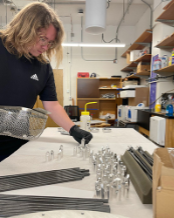
"The Science Scholars program has prepared me for a career in the sciences by providing an environment to meet peers who are on a similar path as I am. Being able to have a like-minded group to be around and to get advice from has been extremely beneficial to my journey."
— Marshall Horton, nuclear energy

"I would absolutely encourage anyone interested to apply for P.S.S. [Parkland Science Scholars]! This program has made my conversion into the sciences so smooth and it’s very reassuring to know I have a scientific community to ask questions and share ideas with."
— Sarah Redman, horticulture

"Always, the most fun part is when you apply what you learn so my favorite part in the program was when I discovered the research world by working with scientists in the UIUC."
— Driss El Andlosy, computer science

"As an aspiring scientist, the Science Scholars program has prepared me for my future career by pairing me up with a supportive mentor, providing the opportunity to do summer research as an undergraduate, and setting us up for success by developing our professional, communication, and technical skills. It has also provided the opportunity to connect with others who are at different levels of STEM careers."
— Kelsey Koch, wildlife biology

"My favorite part of the program so far has been making connections with the science community at Parkland."
— Sarah Porth
"I feel like the program helped me a lot. Because I first joined the program when I was a freshman and had no idea what should I do. While being a part of the program, I have more opportunities to reach and meet more people in the field. I think reading a science paper is a good skill that I have learned."
— Thi "Celina" Bui
"Do it!! You won’t regret it!! Parkland Science Scholars opens so many doors for opportunities that you normally wouldn’t get coming to Parkland every day!! You also meet amazing people in the class that are with you every step of the way!"
— Janae Sparks
Cohorts 1-4 benefits
Financial support of $2,450 each semester for 4 semesters, starting Fall 2025 a bonus cohort will receive $4,900 over 3 semesters
Participation in peer mentoring within the Parkland Science Scholars and with UIUC graduate students
Preparation for and participation in summer research opportunities (paid and unpaid opportunities are available)
Participation and leadership opportunities in Parkland student clubs
Enrollment in Science Scholars Seminar each semester for 4 semesters to learn how to navigate college, train to be a peer mentor, and prepare for careers in science and engineering